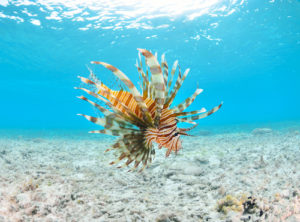
I want to alert you to an issue with potentially devastating impacts on our fisheries, and therefore, our local and state economies. My comments are focused on the situation in the Panhandle, but this crisis exists in the entire Gulf of Mexico and the Atlantic Ocean.
The attached fact sheet provides information on Red Lionfish, an invasive non-native species that has recently infested the waters of the Panhandle. Right now, they are decimating the juvenile fish population on our natural and artificial reefs. Local divers are reporting that the lionfish population has gone from nearly non-existent to exploding over the short course of approximately three years. At some locations this invasive species has totally eradicated native fish populations.
As one diver stated, “Lionfish are a threat of biblical proportions. Like water-breathing locusts, they eat and eat, swarm and multiply, leaving decimated reefs and fisheries in their wakeâ€.
This threat is very real – the native fisheries and reef ecosystems in several Caribbean counties have already been destroyed, even though their governments started addressing the problem years ago. Here in the United States, we have been slow in addressing the problem, even though the impact of the lionfish epidemic was overwhelmingly evident in other countries. In Florida, besides funding some limited research, the only action taken was to remove the bag limit on the lionfish for divers. And yet, some regulatory fishing limitations still exist that don’t allow some technical divers to spear or otherwise take lionfish in state waters. It has been demonstrated in other countries that the lionfish can be controlled with an aggressive and continuing spearfishing program.
However, there must be a motivation for divers to actively spear these invasive fish, given the inherent risk of receiving a venomous sting and the cost of boat trips and diving. In addition to the divers on the frontline, a portfolio of incentives for the many marine and tourism-related businesses and other stakeholders are needed right now to facilitate optimal removal/control efforts of this invasive species from our coastal environments to protect our native marine ecosystems and numerous coastal economies.
‘We must take on the challenge to control the lionfish population, before they wipe out our native fisheries. Although we are still unaware of any long-term effects of the BP oil spill, the Lionfish threat could dwarf the oil spill’s ecological and economic impacts to Florida’s native fisheries. Further, left unmanaged, the lionfish threat increases exponentially over time. The potential negative impact to our marine related businesses, to tourism and to the general welfare of our citizens both immeasurable, and far-reaching:
–Decline in game fish means less fishing by locals: hurting marinas, fuel providers, boat sales, mechanics, tackle shops, commercial fishermen, dive charter boats and dive shops
–Decline in game fish means less fishing by tourists:, hurting hotels, restaurants, gift shops, taxis, airlines, charter fishing boats, dive charter boats and dive shops
–Seafood could become not only much more expensive, we could be presented with far fewer fish choices on menus: hurting restaurants, seafood markets and the average citizen’s pocketbook
Governor Scott has recently proposed a budget with $1.4B to “Protect and Preserve Florida’s Environmentâ€. Nowhere in the budget is a mention of the lionfish issue and the need to implement control measures. In addition, there is not a single proposal to fund lionfish control in any of the submitted projects for NRDA or RESTORE funds from BP – yet this is a larger challenge to our fisheries than the oil spill itself.
Local divers and interested individuals have started to form a coalition to bring attention to this issue. They currently do not have a website, but they do have a FaceBook page at
https://www.facebook.com/gulfcoastlionfishcoalition
If you are interested, the following article looks at the challenge in more depth
http://lionfish.co/why-are-lionfish-a-problem/
I have attached a one page fact sheet on the Red Lionfish
As an illustration, I have attached a picture of one divers’ catch of 91 lionfish of on Friday January 17th, here in our waters just outside Pensacola Pass. He stated that he estimated that there were another 500 remaining on the wreck.
I would be happy to share additional information on this dire situation and the threat that facing our state. That being said, I would ask that you not only educate yourself on this unfolding calamity, but that you share this information with other businessmen, and our politicians. Please feel free to forward this note, so that we can start to educate each other on this crisis. We must act now, before our fisheries are irreparably damaged. Quite frankly, the on-going debate on bag limits for Red Snapper and Grouper is meaningless, if we do not control the lionfish population. Unless we want our future “Seafood Festivals†to turn into “Lionfish Festivals,†we must act now.
Leo Cyr
President
Marina Management Corporation
Director
NorthWest Florida Marine Industry Association